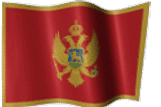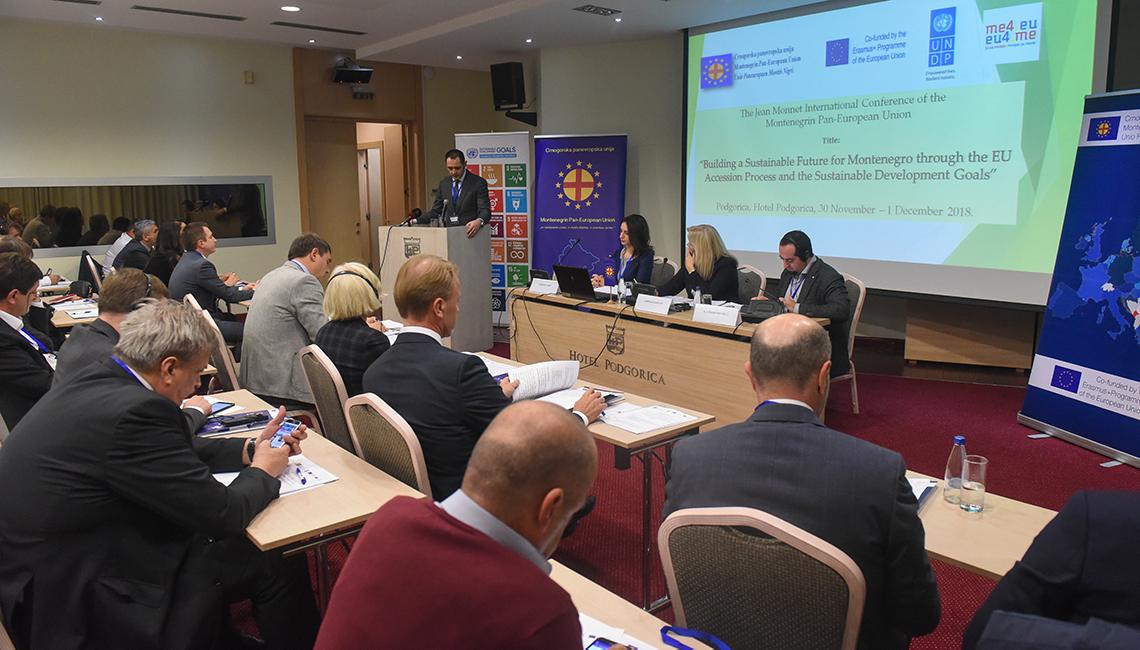Podgorica, PR press service 30 November 2018 – Establishment of an institutional mechanism for sustainable development management, with a budget provided for financing, is a prerequisite for meeting the objectives of the National Strategy for Sustainable Development, and at the same time the goals of the Sustainable Development Agenda by 2030.
This was announced by the Minister of Sustainable Development and Tourism of Montenegro, Pavle Radulović, at the international conference “Building a Sustainable Future for Montenegro through the EU Accession Process and the Achievement of Sustainable Development Goals” organized by the Montenegrin Pan-European Union (MPEU).
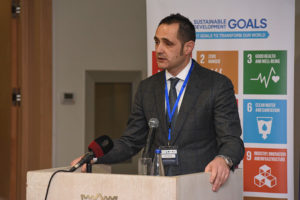
Radulovic said that the measures of the National Sustainable Development Strategy in 2030 provide an answer to national needs and, at the same time, link them with the fulfillment of global ties defined in the framework of the Agenda for Sustainable Development by 2030.
“The strategy introduces a quantified system for monitoring the sustainability of national development, using indicators of sustainable development, which represent a special value of this document. The Strategy was led to report on its implementation, based on the indicator action plan, at a two-year level, beginning with 2019, ” Radulovic said.
According to him, the Ministry is currently working on a preparatory stage of development, which, as he explained, includes compilation of input information for the preparation of the first report.
“One of the priorities, in the following period, is to upgrade the existing one and to establish a new efficient system for monitoring the sustainability of national development, which would include monitoring the implementation of goals, measures and tasks of sustainable development established by the action plan and indicators of sustainable development,” Radulovic pointed out.
He said that the Ministry will work in the future to strengthen the cross-sectoral coordination between the ministries in the Government of Montenegro for the purpose of clarifying the alignment of public policies with sustainable development policies, as defined in the National Strategy for Sustainable Development.”
“This includes the identification of shortcomings at the horizontal and vertical level of administration in terms of taking targets, indicators, sustainable development into a national framework in order to achieve the harmonization of existing relevant strategies, programs and plans with the UN Agenda for Sustainable Development by 2030”, Radulovic specified.
He said that the implementation of a sustainable development policy would be more efficient and effective in the coming period to strengthen political support in the implementation of sustainable development policy and strengthen professional and administrative implementation, “through the establishment of an adequate and functional institutional system for sustainable development”.
The establishment of an institutional mechanism for sustainable development management, with a budget provided for funding, is a prerequisite for meeting the objectives of the National Strategy for Sustainable Development, and at the same time the objectives of the Sustainable Development Agenda by 2030, ” Radulovic pointed out.
Head of the EU Delegation in Montenegro, Aivo Orav, said that this European community is urging Montenegro to take all steps in the fight against corruption and organized crime.
“The latest unofficial document from the European Commission Non-paper on the rule of law focuses on forms in the field of reform, in the field of rule of law and institutional strengthening. However, the practical aspects of legislative and institutional reforms in some areas are not sufficient, and the results remain insufficient, ” Orav said.
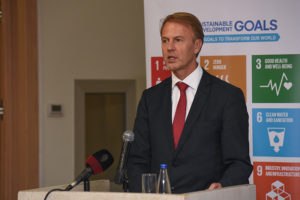
According to him, these restrictions specifically concern certain key areas such as, as he said, the seizure of assets acquired through crime, the fight against money laundering and trafficking in human beings, “as well as the monitoring of all cases involving attacks on journalists and media freedom.”
“At the same time, the opening of Chapter 27 is the next key moment on Montenegro’s path to the EU. As you are well-aware, a country that protects its nature and preserves its biodiversity is also a better place for citizens to live, who can then enjoy the benefits of an adequately protected environment, ” Orav said.
UNDP Resident Representative for Montenegro, Fiona Mekluni, highlighted the Copenhagen criteria that, as she said, seek to improve public administration, legal framework, rule of law, respect for human rights, as well as environmental protection and adapting to the rules of the single market.
“Joining the EU implies criteria for opening and closing each particular chapter. On the other hand, we have Agenda 2030, a sustainable development agenda, which seeks to eradicate poverty and hunger, combat climate change, achieve equity and improve education, health services and support for innovation, ” Mekluni said.
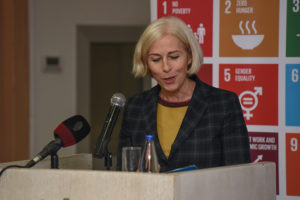
She recalled that the Agenda 2030 was prepared by 193 UN member states, in consultation with ten million people.
“In Montenegro, two percent of the population gave their views and inputs for the needs of this consultative process. As such, this Agenda is considered an agenda of all governments, but also with the Citizens’ Agenda, civil society, academia and businesses, ” Mekluni said.
The Chief negotiator with the EU, Aleksandar Drljevic, said that Montenegro today received “all green lights” from the member states for Chapter 27.
“I believe that at the next Intergovernmental Conference, we will be able to open this negotiating chapter, which will lead us to open one more remaining negotiating chapter 8 Competition,” said Drljevic.
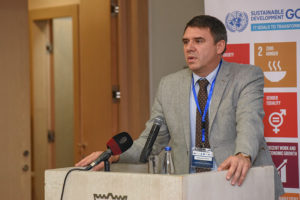
He said that in the Office, which is under his charge, they expect to achieve internal readiness in several negotiating chapters next year, “in order to lead to a gradual closure, I think primarily about the chapters – intellectual property law, commercial law, trans-European network, protection consumers. ”
“Considering that the highest priority in the negotiations with the EU is the fulfillment of obligations under chapters 23 and 24, I am pleased to remind that the EU presented the Non-paper document, which recorded progress in these areas. I believe this will lead to progress in other chapters and our overall progress, when Montenegro’s integration process is in question, “Drljevic said.
The representative of the Capital city, Dragutin Djekovic, pointed out that the city has brought a number of documents and action plans according to which will be managed.
“In September last year, we adopted the action plan for sustainable development of the Capital city. We entered the European initiative for a network of healthy cities. We are currently in the final phase of joining green cities, we have the Local environmental protection plan, and the Strategy for adaptation to climate change, “Djeković said.
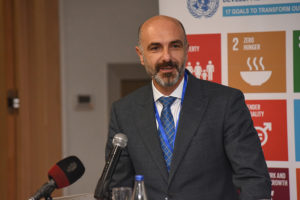
He said that the last activity was the formation of a special service within the Capital city, which, according to him, will deal with international cooperation and projects “which will aim at withdrawing from the EU funds, and which will deal with projects in the field of sustainable development”.
MPEU president Gordana Djurovic reminded that the “UN Agenda 2030-EU Agenda 2025: Through Integration Towards Sustainability in Montenegro” (TISIM) is another project implemented by the organization with the support of the EU.
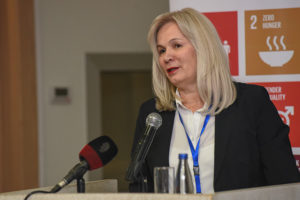
She recalled that the MPEU was established less than three years ago, recalling that it is a member of the International Pan-European Union, which has more than 30 organizations in the EU countries.
Within this project we have three conferences. The first one is open today, and the other two are at the local level in one city in the north and the south. The project should help better communication and linking the themes of sustainable development and the European agenda, ” Djurovic said.
The project “UN Agenda 2030 -EU Agenda 2025: Through Integration Towards Sustainability in Montenegro” (TISIM) is implemented in the period from September 2018 to August 2019, with the support of the EU through the Erasmus + Jean Monnet Project.
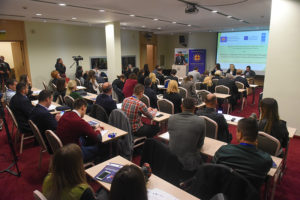
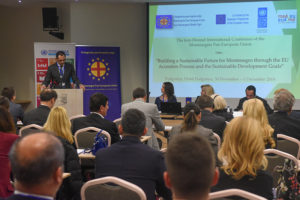
Pavle RADULOVIĆ, ministar, Ministarstvo održivog razvoja i turizma Crne Gore
Aivo ORAV, šef Delegacije EU u Crnoj Gori
Fiona McCLUNEY, UN rezidentna koordinatorka i UNDP rezidentna predstavnica za Crnu Goru
Aleksandar DRLJEVIĆ, šef Kancelarije za evropske integracije, glavni pregovarač sa EU
Dragutin ĐEKOVIĆ, šef Službe za međunarodnu saradnju u Glavnom gradu
Gordana ĐUROVIĆ, predsjednica CPEU



